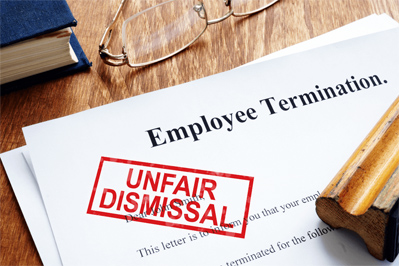Under the Employment Standards Act, if an employee has been continuously employed for three months or longer, the employer must provide the employee with written notice of termination, termination pay, or a combination of both, to terminate their employment. At times, severance pay may also be required. There are statutory requirements under the ESA as to how many weeks of notice and, in some instances, severance, an employee is entitled to.

Wrongful Dismissal

When Notice Not Necessary
However, in certain circumstances where an employer terminates an employee, that employee may not be entitled to notice of termination or termination pay under the ESA. Such circumstances apply to employees terminated with cause, construction employees, employees who have been appropriately laid off, employees that refuse an offer of reasonable alternative employment and employees that have been employed for less than three months.
When Wrongful Dismissal Happens
Where wrongful dismissal is present, the individual may be entitled to compensation. Wrongful dismissal is a term that is often misunderstood, in the sense that it does not always merely arise when a person’s employment has been terminated. Wrongful dismissal usually occurs through the following situations:
- ∎ Where an employer terminated the employment and improperly alleges cause, while failing to provide the employee with reasonable notice of termination
- ∎ Where an employer has terminated the employment without cause and has refused or failed to provide the employee with reasonable notice of termination; or
- ∎ Essentially, wrongful dismissal occurs where a person has been terminated without notice for any reason, other than “just cause.”
Mitigation
In Canada, former employees – who are the innocent party – are required to take reasonable steps to mitigate their damages in a wrongful dismissal case.
The onus of proving that the employee has failed to adequately look for work falls on the shoulders of the employer.
However, practically speaking it is always best that the employee complies with their legal obligations by taking reasonable efforts when seeking alternative employment. Thus, for example, a person should be able to show documented proof that he or she is making an effort to find new employment, of a similar type. If the industry for reemployment in a similar type of career is challenging, it will be said to be a factor in favour of the employee’s argument that they were reasonable in mitigating their damages by changing careers to find new employment. Where a person obtains a benefit from the duty to mitigate under the right circumstances that benefit may be deducted from common law damages due in lieu of reasonable notice.
We Act For EMPLOYERS
It is important that employers are fully informed regarding whether the termination is warranted before alleging cause or taking steps in anger that may expose your business to further damages in the event of a legal proceeding. For example, if an employee is terminated for cause but cause is improperly alleged, this could lead to a wrongful dismissal claim with added liabilities.
Additionally, employers must be careful. This is because in addition to the employee’s statutory rights under the ESA, the employer may be liable for significant damages for failure to provide the employee with reasonable notice of termination at common law.
Law Wise employment lawyers understand the risks involved when terminating an employee or when dealing with a wrongful dismissal proceeding. We can help provide the legal advice and guidance needed to make fully informed decisions to determine if termination is warranted while evaluating the risks to determine the best steps to take.
In cases of wrongful dismissal litigation, our experienced lawyers can help provide the expert legal guidance needed throughout each step of the process including in negotiating a settlement with the former employee or his or her lawyer or in court.
We Act For EMPLOYEES
Law Wise employment lawyers approach wrongful dismissal issues with logical and creative solutions. Our lawyers are professional, friendly, and determined. We have the know-how to navigate through the psychology of any given wrongful dismissal dispute.
Where a Court finds wrongful termination at common law, the employer could well be liable for certain economic consequences incurred during the period the court determines is the reasonable notice of termination. An employee that has been wrongfully terminated is entitled to pay in lieu of reasonable notice which would consist of all entitlements the employee would have been eligible for but for his or her termination, such as bonuses, pay increases, etc. More often, however, employees are entitled to what is colloquially referred to as a “severance package.”
Each individual’s case is unique to his or her circumstances. Contact Law Wise employment lawyers today to discuss your options to determine whether you may be entitled to receive compensation.
How Can Law Wise Help?
Each individual’s case is specific to his or her circumstances. If you have experienced wrongful termination, or to determine whether you may be entitled to receive compensation, contact Law Wise today and speak with one of our experienced lawyers to discuss your options.
Call us at +1 647 948 7819 today!

